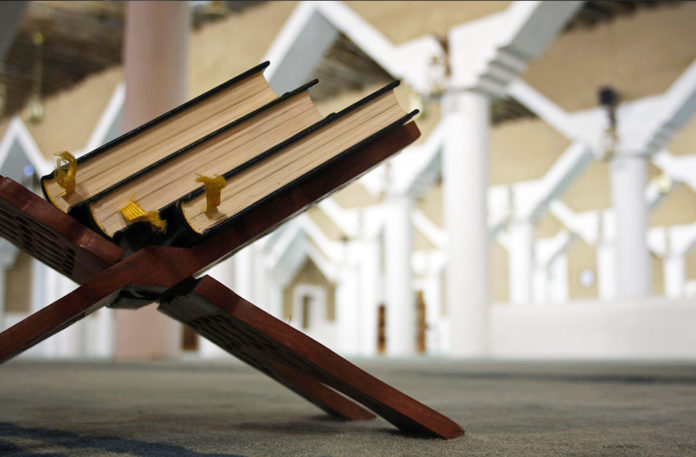[1] Six Etiquettes of Learning [1]
Ibn Qayyim al-Jawziyyah[2]– rahimahullaah – said:
| “There are six stages to knowledge: Firstly: Asking questions in a good manner. Secondly: Remaining quiet and listening attentively. Thirdly: Understanding well. Fourthly: Memorising. Fifthly: Teaching. Sixthly- and it is its fruit: Acting upon the knowledge and keeping to its limits.” [3] |
[2] Fruits of Humility
Ibn al-Qayyim – rahimahullaah – said:[4]
| One of the Salaf (Pious Predecessors) said: “Indeed a servant commits a sin by which he enters Paradise; and another does a good deed by which he enters the Fire.” It was asked: How is that? So he replied: “The one who committed the sin, constantly thinks about it; which causes him to fear it, regret it, weep over it and feel ashamed in front of his Lord – the Most High – due to it. He stands before Allah, broken-hearted and with his head lowered in humility. So this sin is more beneficial to him than doing many acts of obedience, since it caused him to have humility and humbleness – which leads to the servant’s happiness and success – to the extent that this sin becomes the cause for him entering Paradise. As for the doer of good, then he does not consider this good a favour from his Lord Upon him. Rather, he becomes arrogant and amazed with himself, saying: I have achieved such and such, and such and such . So this further increases him in self adulation, pride and arrogance – such that this becomes the cause for his destruction.” |
[3] Purifying the Heart
Ibn al-Qayyim – rahimahullaah- said:
| “There is no doubt that the heart becomes covered with rust, just as metal dishes – silver, and their like – become rusty. So the rust of the heart is polished with dhikr (remembrance of Allah), for dhikr polishes the heart until it becomes like a shiny mirror. However, when dhikr is abandoned, the rust returns; and when it commences then the heart again begins to be cleansed. Thus the heart becoming rusty is due to two matters: sins and ahafah ( neglecting remembrance of Allah ). Likewise, it is cleansed and polished by two things : istighfaar (seeking Allah’s forgiveness) and dhikr.” [5] |
[4] Jihaad Against the Self
When these four stages are completed then such a person is considered to be amongst the Rabbaaniyyoon. The Salaf were agreed that a Scholar does not deserve the title of Rabbaanee until he recognises and knows the truth, acts upon it, and teaches it to others. So whosoever has knowledge, acts upon it, and teaches this knowledge to others, is considered from the Rabbaaniyyoon.”[6]
[5] Trials of the Heart
Ibn al-Qayyim said, whilst commenting upon the following hadeeth:
| “Trials and tribulations will be presented to hearts, as a reed mat is interwoven stick by stick. Any heart which absorbs these trials will have a black mark put in it. However, any heart that rejects them will have a white mark put in it. The result is that hearts will be of two kinds: one white like a white stone, which will not be harmed by trials as long as the heavens and earth endure; and the other dark and rusty, like an over-turned vessel; not able to recognise the good, nor reject evil, but rather being absorbed with its desires.”[7] |
| “The fitan (trials) which are presented to the hearts – and which are the cause of its weakness – are: (i) the trials relating to shahwah (false desire) and (ii) the trials relating to shubhah (doubt) … so the first causes intentions and desires to be corrupted, whilst the second causes knowledge and beliefs to be corrupted”.[8] |
Speaking about such trials, he – rahimahullaah – said:
| “Hearts – when exposed to such fitan (trials) – are of two types:
|
[6] Four Principles of Worship
(The Aayah):
| “You alone do we worship.” [Surah al-faatihah,1:5] |
is built upon four principles:-
Ascertaining what Allah and His Messenger love and are pleased with, from (i) the sayings of the heart and [ii] of the tongue; and (iii) the actions of the heart and [iv] of the limbs.
So al-‘uboodiyyah (servitude and slavery to Allah) is a comprehensive term for all these four Stages. The one who actualises them has indeed actualised:
The saying of the heart: It is i’tiqaad (belief) in what Allah – the Most Perfect – informed about His Self; concerning His Names, His Attributes, His Actions, His Angels, and all that He sent upon the tongue of His Messenger sallAllahu ‘alayhi wa sallam.
The saying of the tongue: It is to inform and convey (what Allah has revealed), to call to it, defend it, to explain the false innovations which oppose it, to establish its remembrance and to convey what it orders.
The action of the heart: Such as love for Him, reliance upon Him, repenting to Him, having fear and hope in Him, making the Deen purely and sincerely for Him, having patience in what He orders and prohibits, having patience with what He decrees and being pleased with it, having allegiance and enmity for His sake, humbling oneself in front of Him and having humility in front of Him, becoming tranquil with Him and other than this from the actions of the heart which are actually connected to the action of the limbs … and actions of the limbs without the action of the heart is of little benefit if any benefit at all.
The action of the limbs: Such as Prayer and Jihaad, attending the Jumu’ah and being with the Jamaa’ah, aiding those who are unable and displaying goodness and kindness to the creation, and other than this.”{10]
References :
1. The following are some points of benefit – extracted from the various works of the Shaykh pertaining to purification of the souls and curing the diseases of the hearts.
2. He is Abu ‘Abdullaah, Shamsud Dcen Muhammad ibn Abu Bakr better known as Ibn al-Qayyim (or ibn Qayyim al-Jawziyyah). He was born in the year 691H in the city of Damascus. From an early age he set about acquiring knowledge and studied under many prominent teachers, the most notable of whom was Shaykhul-lslaam Ibn Taymiyyah. His students include the likes of Ibn Katheer, adh-Dhahabee, Ibn Rajab, Ibn ‘Abdul-Haadee and others. He authored over ninety books and booklets – all of them being characterised by their touching address to the soul and the heart, as well, as their accuracy, precision and depth of research. Ibn al-Qayyim died on the night of Thursday 13th Rajab at the time of the ‘Ishaa adhaan in the year 751H. Testaments about his comprehensive knowledge, firm adherence to the way of the Salaf; excellent manners, worship and zuhd have been given by Al-Haafidh Ibn Hajar in ad-Dururul-Kaaminah (3/400), Al-Haafidh Ibn Rajab in Dhayl Tabaqaatul-Hanaabilah(2/447), ash-Shawkaanee in al-Badrut-Taali'(2/143-146) and also Al-Haafidh Ibn Katheer who said about him in al-Bidaayah wan-Nihaayah (14/246): “He attained great proficiency in many branches of knowledge, particularly knowledge of Tafseer, Hadeeth and Usool. When Shaykh Taqiyyud-Deen Ibn Taymiyyah returned from Egypt in the year 712H, he stayed with the Shaykh until he died, learning a great deal of knowledge from him; along with the knowledge which he had already occupied himself in obtaining. So he became a singular Scholar in many branches of knowledge. He also continued to seek knowledge greatly day and night and was constant in humbly calling upon his Lord. He recited well and had fine manners. He had a great deal of love and did not harbour any envy for anyone, nor harm anyone, nor seek to find fault with anyone, nor bear any malice towards anyone. I was one of those who most often kept company with him and I was one of the most beloved of people to him. I do not know anyone in the world, in this time, who is a greater worshipper than him. His Salaah (Prayer) used to be very lengthy, with prolonged rukoo’ (bowing) and sujood (prostration). His companions would often reproach him for this, yet he never retorted back, nor did he abandon this practice – may Allah shower His Mercy upon him.
3. Miftaah Daarus-Sa ‘aadah ( p.283).
4. Al-Waabilus-Sayyib minal-Kalimit-Tayyib ( p. 15).
5. Al-Waabilus-Sayyib (p.80).
6. Zaad ul-Ma’aad fi Hadee Khayril-‘Ibaad (pp.9- 11) .
7. Related by Muslim (no.144), from Hudhaifah radiAllahu ‘anhu.
8. Ighaathatul-Luhfaan ( p.40).
9. Ighaathatul-Luhfaan (pp. 39-40).
10. Madaanjus-Saalikeen(1/100-101)






















